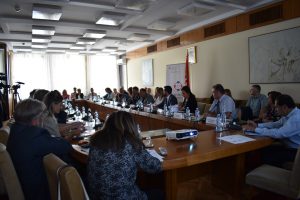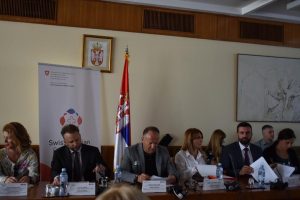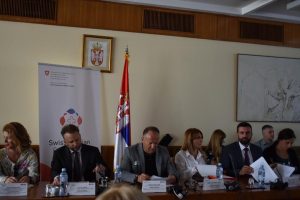Conference on National Qualifications Framework in Serbia
On 30th August 2018, the Conference on National Qualifications Framework in Serbia was held in the Palace of Serbia. It was attended by more than 70 participants from different Ministries, relevant educational institutions, organizations, unions of employers, trade unions, associations of vocational schools and high schools, Conferences of Serbian Universities, National Employment Agency, Statistical Office of the Republic of Serbia, Central Registry of Compulsory Social Insurance including some of the civil society organizations.
Special guests of the Conference were: Deputy Head of the Swiss Embassy in Belgrade, Mr. Jean-Luc Oesch and Jovana Mihajlović, Leader of the National Migration and Youth Employment Program on behalf of the Swiss Agency for Development and Cooperation, Steffen Hudolin, Head of Operations II of the EU Delegation and Irena Radinović, Project Leader for Education, Operations II, on behalf of the EU Delegation to Serbia. The Conference was also attended by the representatives of the Serbian Prime Minister’s Office.
The Workshop part of the NQFS Conference was delivered by special guests, experts from the Republic of Croatia, Prof Dr Mile Dželalija, professor at the University of Split, the expert who took part in the work of the subordinate work group engaged in the preparation of the European Qualifications Framework in 2006 and in the same year took over the leadership over the group working on the development of the Croatian Qualifications Framework; the recognized international expert for the development and implementation of qualification networks in numerous countries of Europe and worldwide and Prof. Ružica Beljo Lučić, professor at the University of Zagreb, also the expert that has been engaged on the development and implementation of CQF on a long-term basis, concurrently discharging the role of the president of the National Council for Development of Human Potential of Croatia.
The Conference was opened with the welcome address by the Ministry of Education, Science and Technological Development, who reminded all the participants that the adoption of the Law on NQFS in April this year, brought along the legal framework enabling the regulation of qualifications and creating the connection between all levels and types of qualification with the labour market. Mr. Šarčević stated that the Ministry had already founded the NQFS Council, by the RS Government Decision, while forming of Sector Skills Councils for the departments proposed by the Ministry of Education, Science and Technological Development that had been approved by the Serbian Prime Minister’s Office. The Minister announced that the Qualifications Agency would be established by the end of 2018 and underlined that in forming all those bodies, the Ministry cooperated with the Serbian Chamber of Commerce. The Minister announced the establishment of the Qualifications Agency by the end of 2018 and pointed out that in the establishment of all those bodies, the Ministry cooperated with the Serbian Chamber of Commerce. Also, as the Minister reiterated, both the economy and employers had been involved in all the education-related bodies to be established.
After the Minister, the Conference was addressed by Mr. Oesch, Deputy Head of the Swiss Embassy, who stressed in his speech the importance of establishing the link between education and employment that, as he asserted, constitutes an important topic equally in Switzerland and in Serbia.
The representative of the EU Delegation to Serbia, Mr. Hudolin, reminded the attendees that the EU Delegation had followed the work of the Ministry of Education, Science and Technological Development, in particular with regard to the establishment of the National qualifications framework and underlined that the Law on NQFS set out the vision of the qualifications system in Serbia, representing the priority structural reform in line with the European and national strategic documents.
The Assistant Minister for higher education, Mr. Tubić, reminded all the attendees about all the results reached until that date in relation to the National Qualifications Framework and stressed that the Project “Support for the Implementation of Employment and Social Policy Reform Programme in the Republic of Serbia with a Focus on Employment Policy and Increasing Youth Employability” funded by the Swiss Agency for Development and Cooperation, provided to the Ministry an outstanding support in developing the National Qualifications Framework and sector skills councils, as the strategic move towards reducing the skills-related gap, between the requirements of the labour market and educational outcomes.
After Mr. Tubić, Ms. Grujić, Assistant Minister for Dual and Entrepreneurial Education took the floor and in her address pointed out that the implementation of NQFS was one of the strategic priorities of the Government of Serbia. In her speech and presentation Ms. Grujic underlined that the Council for NQFS had already been established, that by the end of 2018 the Government of the Republic of Slovenia would establish the Qualification Agency, as well as 12 sector skills councils proposed on the basis of market analysis. The Assistant for Dual and Entrepreneurial Education notified the participants at the conference that, in accordance with the Law on NQFS, the Ministry was in the process of adopting the regulations and all the subordinate legislation in the field of the National Qualifications Framework
Following the introductory speeches, the workshop part of the conference started and the guest experts from Croatia took the floor, inviting all conference participants to form groups of 4 or 5 and exchange thoughts and share their opinion about the future composition and financing of the anticipated sector skills councils. Specifically, in their presentations, experts emphasized that it was important that the members of the groups critically review the Law on NQFS and that it was an ideal opportunity for all attendees to express their opinion, possible disagreement with the provisions of the Law, different interpretations of certain attitudes and articles of the Law and other. Participants of the conference received work material that was produced on three thematic units: definition of the role and tasks of sector skills councils, identification of relevant stakeholders and organizations to participate in sector skills councils and models of funding the sector skills councils.
The Conference was closed by the closing address by the experts Dželalija and Beljo-Lučić who, once again, underlined that the purpose of the workshop and the entire event was to inform all the participants with the Law on NQFS, but also to get familiarized with the systems applied in other countries. The Croatian experts reminded the attendees about the fact that the Law on NQFS did not define all and that some issues were yet to be laid down by subordinate legislation, including that the work of sector skills councils should be closely monitored, considering that their role is critical both for in education and for the labour market.
Prof Dr Gabriela Grujić, thanked to all the participants for their engagement and taking part in the Conference.




